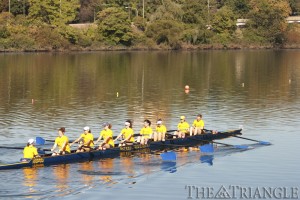
As an outsider it’s hard to understand why rowers put their bodies and minds through such a grueling process. The only way to understand the mind of a rower is to become one — so that’s what I did. What better time to row than at the crème-de-la-crème of rowing — the Dad Vail.
Since I am not a collegiate rower, there was only one way I could partake in the races — to row in the corporate challenge. My mother’s company, Hope Paige Designs, entered a novice eight into the race — and lo and behold, we won our heat.
I can honestly say I get it now.
Winning was a perk, but the experience was unexplainable. Rowing in tandem with seven other people takes teamwork and dedication. There’s something to be said about training year-round for a race that only lasts about five minutes.
But racing in the Dad Vail made me wonder: what comes next? What happens if you leave your heart on the water and then you lose? When I spoke with a former Princeton rower, I asked him that very question — he laughed at me and said, “There will always be winners and losers in sports, It’s how the losing team bounces back that truly defines their success.”
Over 400 boats raced on the Schuylkill that Saturday, and only 71 of them won. That means that more than three-fourths of the competition lost, and yet the colleges — winners and losers alike — come back each year to do it all over again.
Drexel is one of those teams that never gives up. Last year at the 2010 Dad Vail, the Dragons medaled at the race for the first time since 2005 and earned a pair of gold medals from the men’s varsity pair and the men’s second varsity eight. They also took silver in the men’s freshman eight, and earned third in the women’s varsity eight. Needless to say, the team had high expectations leading up to the 2011 Dad Vail.
The Dragons sent five boats into the grand finals at the 2011 races — two of which came away with medals. Veteran varsity pair, gold medalists Liam O’Neill and Peter Schmidt, came in first and earned the Bob Negaard Trophy with the 7:17.70 time.
The men’s novice eight, which consists of coxswain Marc Smith, stroke John Pieper, Vanja Busic, Sebastian Ryan, Marcus DeMarici, Ryan McSpedon, Steven Miner, Matthew Ryan and bow Ross Morris, took home the silver for the Dragons.
The director of the Dad Vail and Chairman of the Gold Cup, Hebert Lotman, said that the crews’ hard work came across in more ways than one.
“In the three years I have been involved, this year has been by far the best,” Lotman said. “Everyone I have spoken to said it was one of the best regatta events they have ever seen on the Schuylkill River — and they couldn’t believe the amount of TV exposure we had — no other rowing event has been broadcasted across the United States like we were.”
The Dad Vail was televised on 6ABC and ESPN3. The ratings and responses from this year’s event have been higher than any in the past. And for those who actually attended the Dad Vail, there was no shortage of tents, food and of course, Port-O-Potties!
Though accommodations were quite the hype, the real center of attention was the Gold Cup races.
The Gold Cup is the Stanley Cup of rowing. It has returned to the Dad Vail for the first time in nearly 50 years and is awarded to the top male and female international single sculling winner.
“1966 was the last inscription on the Gold Cup and now they will have a man, and the first woman ever, inscribed on the Gold Cup,” Lotman stated. “And I really enjoyed watching the international rowers compete — the four men and four ladies competing for their names on the Cup were outstanding.”
For an oarsman or woman to have his or her name engraved on the Gold Cup instantly makes them rowing royalty. For the fortunate attendees and viewers of the Dad Vail, they witnessed history when the Czech Republic’s Mirka Knapkova won on the women’s side, and Slovenia’s Iztok Cop won on the men’s.
The Dad Vail seemed to make a splash not only in the rowing community, but also in hearts of sports fans nationwide.
As far as plans for next year’s races, Lotman said, “We are certainly going to try to improve what we are doing and have it larger, bigger and better.”
The Dad Vail marks an important day for rowers nationwide. For crews that won medals, congratulations. For crews that lost, well, there’s always next year.
As for Drexel, they will take the momentum they’ve gained by winning two medals at the Dad Vail Regatta and use it on the water for their next regatta June 2-4 on the Cooper River in Camden, N.J., for the IRA National Championship.


